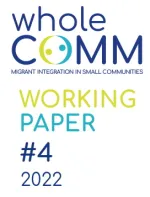Post-2014 migrants''acces to housing, employment and other crucial resources in small- and medium-sized towns and rural areas in Austria

Working Paper No. 4 - Austria
This report examines post-2014 migrants’ access to housing, employment, and other relevant resources in different small and medium-sized towns and rural areas in Austria. The research in Austria focused on four localities in two provinces (Lower Austria and Tyrol), and in terms of categories of migrants, refugees and asylum seekers that had arrived since 2014. Primarily based on interviews conducted in each of the four selected municipalities, the report provides an overview of 1) the concrete barriers that post-2014 migrants are facing in relation to housing and employment; 2) the local actors who are involved in, and/or seen as responsible for, facilitating their access; 3) any concrete local measures or practices that help or hinder this access; and 4) the specific target groups of these measures, initiatives or practices.
The report finds that access to housing has been challenging for refugees in all four localities studied. Importantly, housing as a policy area largely falls into the competence of provincial governments and municipalities. While asylum seekers have been dispersed across the Austrian territory and a fairly elaborated national and provincial framework exists for this, beneficiaries of international protection are not addressed by any specific overarching housing policies. NGOs have thus been at the forefront of addressing issues, although municipalities do dispose of limited means (notably municipal housing) to address the challenges of housing transitions from the initial accommodation provided under the basic care regime to independent housing. Overall, however, beneficiaries of international protection have to rely on the private housing markets. High rents, limited supply of housing and lack of access to public housing are the main barriers, alongside discrimination and language barriers. In the two localities in the Tyrol, the short-term allocation of flats to tourists also increases competition in the housing market, where newly arrived migrants and refugees are disadvantaged from the outset. Overall, access to housing is often more difficult than access to the labour market. As a result of these challenges, newly arrived migrants tend to live in poorer neighborhoods and/or buildings. To facilitate successful housing transitions starter flats run by NGOs and initiatives with private landlords have been launched.